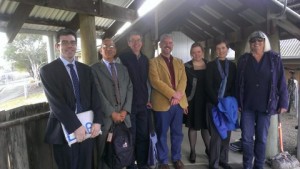Dr Tim Nelson, AGL
Dr Fereidoon Sioshansi, Menlo Energy Economics (USA)
Harry Creamer, Climate Change Australia
Adam Blakester, Starfish Initiatives
Lauren Zell, NSW Office of Environment Heritage
Liz Gardiner, Starfish Initiatives
Dr Judith McNeill, Institute for Rural Futures UNE
A pioneering new initiative to create Australia’s first “Zero Net Energy Town” (ZNET) was launched today. The first stage of work will be creating a blueprint and business case for the concept.
The ZNET idea is to create a distributed ‘mini’ electricity and energy system for a rural town in the New England region of NSW, utilising the cutting edge of energy network technologies and solutions. The model utilises local renewable energy resources, energy management and storage technologies. Local involvement is key and is woven throughout all aspects of energy supply and usage as well for investment, governance, employment and financial returns.
“The key outcomes of a Zero Net Energy Town will be regional jobs, a stronger regional economy and more affordable energy prices,” said Adam Blakester, Project Director and Executive Director of Starfish Initiatives. “We are seeing hundreds of rural towns realise these objectives elsewhere in the world. The potential value of this model for Australia is quite significant, particularly given how abundant its renewable energy resources are and how distributed our energy needs are.”
The project is being led by a Consortium of organisations and has the support of NSW Office of Environment Heritage. Most of the member organisations have been working on the initiative for well over one year now.
The current members of the Consortium are: the Institute for Rural Futures at the University of New England; the Office of Adam Marshall, Member for Northern Tablelands; the Regional Clean Energy Program of NSW Office of Environment Heritage; NSW Trade Investment; Regional Development Australia Northern Inland; and Starfish Initiatives.
“Zero Net Energy Town has the potential to create a new model of electricity and energy infrastructure for rural and regional Australia,” added Dr Judith McNeill, Senior Research Fellow with the Institute for Rural Futures. “This model may create much needed financial and economic benefits by transforming what is currently a significant economic leakage and cost area into being a new industry and area of employment and income.”
“Community energy initiatives like ZNET have great promise as sustainability ‘sweet spots’,” continued Blakester, “meaning they can deliver significant economic and financial outcomes as well as creating stronger rural communities and benefiting the natural environment.”
The Bavarian town of Wilpoldsried was represented by their Mayor Arno Zengerle at the recent inaugural Community Energy Congress in Canberra. Wilpoldsried produces 460% of the town’s energy needs from a mixture of bio-gas, wood, solar, wind and hydro generation. Their energy system includes distributed heating (for all public buildings) as well as electricity. This has created significant new industry and employment and turned around the fortunes of what once was a ‘dying rural town’. The town is now growing, with new investment, industry and employment. Dozens of tour groups visit Wilpoldsried every year to see and learn from their pioneering distributed and renewable energy model.
The immediate priorities for the ZNET initiative are to seek tenders for the blueprint and business case plus the selection of the town for the pilot. Announcements regarding each of these matters will be made over the coming few months. The project will be completed by June 2015.
See here for more details of the Zero Net Energy Town initiative.
